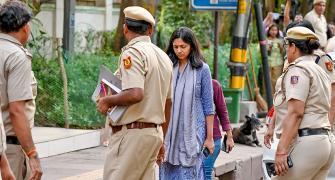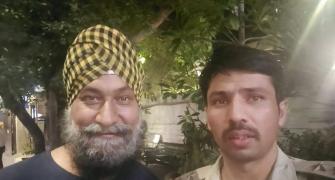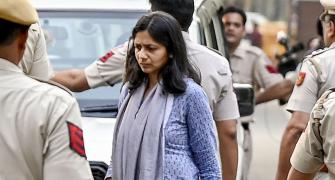College admissions are just around the corner, and if you're still undecided about which stream to pick, it's about time you made up your mind. If you think you want to take up Science, here's what you need to know:
Percentage
The very first qualifying criteria would be your academic performance in your Class X board examination. While technically even a 50 per cent would enable you to qualify for admission into science, only 85 per cent or higher would enable you to target your city's top-notch colleges.
Interests
There are a number of career options available for students choose the Science stream such as medicine, engineering and software. However, science is a course that requires a high level of commitment and focus. So, unless you have a reasonably strong interest in the subjects and are prepared to work hard for the next two years, science might not be for you.
Subjects offered
Most colleges that offer Science have the following subjects, or combinations thereof.
-
Physics
-
Chemistry
-
Mathematics
-
Biology
-
Electronics
-
Computer Science
-
Botany
-
Zoology
-
Bio-technology
-
Genetics
Career options
After successfully completing a Science course, a number of career options are available to students. They can be classified into 4 streams:
-
Science, which includes careers in biochemistry, commercial pilot, environmental science, food technology & processing, geology, molecular biology among many others.
-
Engineering, which includes aeronautical engineering, architecture, biomedical engineering, space technology etc.
-
Medical, which includes ayurveda, dentistry, homeopathy, microbiology, ophthalmologist, physiotherapy, psychiatry, speech and hearing, veterinary science etc.
-
Computers and IT, which includes computer-aided design, computer engineering, software engineering among many others.
Competitive examinations
If you intend to pursue a career in medicine or engineering, you will need to clear some competitive examinations first. Given below are the various examinations you should know about and the eligibility criteria for each:
~ Engineering:
All-India Engineering/ Architecture Entrance Examination (AIEEE)
This is conducted by the CBSE board, the Department of Secondary and Higher Education, Ministry of Human Resource Development for admission to degree-level courses in engineering and architecture in central universities, National Institutes of Technology, deemed universities and institutions in the states/ union territories other than those covered by the Joint Entrance Examination/ state-level entrance examination for paid or unpaid seats based on the score.
Eligibility:
- The candidate would have to be a pass in 10+2 (senior secondary Class XII) examination or its equivalent referred to as the qualifying examination from a recognised Board/University.
- Candidates appearing for in 10+2 final or an equivalent examination may also appear for AIEEE
- Candidate must be an Indian national and must be between 16-24 years of age on the first day of October of the year of admission. In the case of SC, ST and PH candidates, upper age limit is relaxed by five years.
The application can be made either online (http://www.aieee.nic.in/) or by submitting the prescribed application form.
Joint Entrance Examination (JEE)
The JEE is the admission test conducted by the Indian Institutes of Technology (IITs). Apart from the IITs, the Institute of Technology - Banaras Hindu University (Varanasi) also consider JEE for their admission process. The admissions to the undergraduate programmes for all Indian and foreign nationals at these institutions are made through the JEE.
The JEE consists of:
- Preliminary examination (screening test): A three-hour objective paper in physics, chemistry and mathematics. Only candidates who qualify in the screening test are eligible to appear for the main examination.
- Main examination: This exam has papers in physics, chemistry and mathematics, lasting two hours each.
Graduate Aptitude Test in Engineering (GATE)
The GATE is an all-India exam conducted by the seven Indian Institutes of Technologies on behalf of the National Coordinating Board - GATE, Department of Education, Ministry of Human Resources Development (MHRD) and Government of India.
Admission to postgraduate programmes, with MHRD and other government scholarship/ assistantship, in engineering/ technology/ architecture/ pharmacy/ science at engineering colleges/ institutes in the country will be open only to those who qualify through GATE.
National Aptitude Test in Architecture (NATA)
The NATA is an aptitude test that measures the talent of the applicant in terms of his/ her aesthetic sensitivity and critical thinking related specifically to architecture.
Admissions to the first year of BArch at all institutes/ schools/ colleges of architecture in India (including NITs, IITs and private universities), leading to a Bachelor's degree in architecture requires candidates to take the NATA.
~ Medicine
Entrance examinations to medical colleges are conducted on an all-India basis and state-wise basis. Apart from this, some national-level institutions also conduct their own entrance tests. The tests are based on the Class XII syllabus.
Eligibility: Interested candidates must complete 10+2/ equivalent with physics, chemistry and biology, or be from a pre-medical or BSc background.
All-India Pre-Medical/ Pre-Dental Entrance Examination (AIPMT)
The Central Board of Secondary Examination, Delhi conducts the exam to select the candidates for admission to roughly 15 per cent of the total seats in all medical/ dental colleges run by the Union of India, state governments, municipal or other local authorities.
Eligibility:
- Only Indian nationals are eligible to apply.
- He/she has completed 17 years at the time of admission or will complete the age on or before December 31 of the year of his/ her admission.
- The upper age limit is 25 years as on December 31 of the year of the entrance examination.
- The number of attempts a candidate can avail of is limited to three.
- Interested candidates must complete 10+2/ equivalent with physics, chemistry and biology.
- Minimum percentage of marks taken together in physics, chemistry and biology is 50 per cent in case of general candidates and 40 per cent for SC/ST/OBC candidates.
All India Institute of Medical Sciences Entrance Exams
The exams for admissions to All-India Institute of Medical Sciences (AIIMS) conducted all over the country.
Apart from the above, there are other entrance examinations conducted for admission into various MSc and other post-BSc academic programmes. One of these examinations is the Joint Admission Test (JAM) for an MSc programme.
Yet another examination is the Joint Entrance Screening Test for candidates who wish to do PhD programme in physics/ mathematics / theoretical computer science.
As you can see, there is a wide range of options available to students in who opt for Science. This is probably why most parents of students prefer this stream. So, if you are prepared to work hard and stay focused, there is no reason why you can't make a success of your college career.







